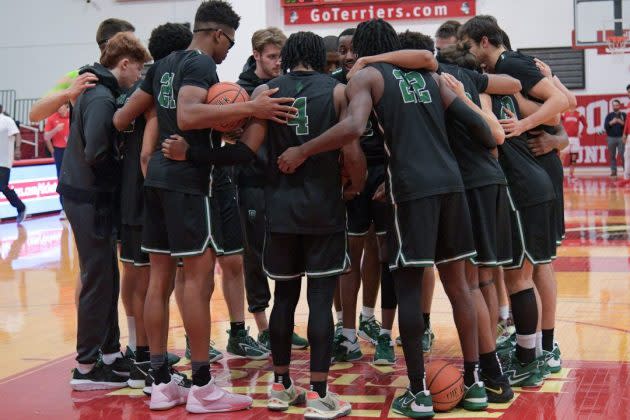Dartmouth Hoops Specifies Union Push Amid Unfair Labor Claims

Last week, the Service Employees International Union (SEIU) filed a petition with the National Labor Relations Board for the recognition of 15 men’s basketball players at Dartmouth College as a union. Monday featured two significant developments: the Dartmouth players publicly expressed their rationales for seeking to unionize, and an advocate for college athletes filed an unfair labor practice charge against Dartmouth College.
Big Green players Cade Haskins and Romeo Myrthil wrote an op-ed published by the student paper, The Dartmouth, in which they explained why they and their teammates are pursuing a union. They note that the Ivy League, unlike other DI conferences, prohibits athletic scholarships (a policy currently being challenged in an antitrust lawsuit). From that lens, the athletes at Dartmouth already receive less compensation from the school in recognition of their athletic services than do their peers at many other DI schools.
More from Sportico.com
College Athlete Pay Push Looks to SAG-AFTRA Reality TV Rules
SEIU Lays Claim to Dartmouth Basketball in Unionization Push
NCAA Calls Out UNC Leaders After 'Violent Threats' in Transfer Case
Haskins and Myrthil write that many of their teammates “juggle part-time jobs” alongside their academic and athletic demands. In an argument that echoes Johnson v. NCAA, the players argue they should be paid hourly wages like their classmates who hold jobs on campus and should receive more money to cover expensive health insurance deductibles. The student dining services workers have unionized and recently negotiated a $21 per hour wage, nearly three times the federal and New Hampshire minimum wage of $7.25 per hour.
The two players also directly challenge Dartmouth president Sian Leah Beilock, who has advocated for “brave spaces” (in contrast to “safe spaces”) as a means of challenging convention and welcoming new perspectives as evidence and data lead. “Will the leadership of [Dartmouth] have the courage,” the players ask, to enter a “brave space” where in recent years judges, lawmakers and regulators have become highly critical of the NCAA’s amateurism model?
Also on Monday, Michael Hsu, a former University of Minnesota regent who directs the College Basketball Players Association (CBPA), filed an unfair labor practice charge against Dartmouth. Hsu previously filed ULPs against the NCAA (2021) and Northwestern (this past July). Another player advocacy group, the National College Players Association (NCPA) led by Ramogi Huma, filed a ULP last year alleging that the NCAA, Pac-12 and USC are joint employers of Trojan football and men’s and women’s basketball players.
Hsu, who is also urging SAG-AFTRA to welcome college athletes as members, argues that Dartmouth has unlawfully violated Section 8 of the National Labor Relations Act by classifying college athletes as “student athletes.” This viewpoint tracks that of NLRB general counsel Jennifer Abruzzo, who maintains that colleges and the NCAA use the “student athlete” moniker to deprive players of workplace protections, including pay and other employment benefits.
The ability of Hsu, Huma and other college athlete advocates to file ULP charges against different schools without the involvement of the athletes reflects the absence of a standing requirement. Under federal law “any person” may file a charge “alleging that any person has engaged in or is engaging in any unfair labor practice affecting commerce.” The NLRB website also makes filing a charge relatively easy and quick.
ULP charges, which lead to agency interviews with witnesses and fact-finding that occur over many months, normally fall short of their goals. Last year, the NLRB fielded 17,998 charges, of which only 738 (4%) have led to complaints—a similar percentage to that shown in prior years. Usually about a third of charges led to settlements, the NLRB’s preferred method of dispute resolution.
Despite those odds, the NLRB issued a complaint in the matter involving USC players, with a regional director alleging that the NCAA, Pac-12 and USC “have maintained unlawful handbook rules” and “unlawfully misclassified” athletes as student-athletes to avoid recognizing their employment and accompanying protections. An administrative law judge will review the USC matter in November and it could lead to review by the agency’s board in Washington D.C. and litigation in federal court.
Hsu’s ULP charge won’t alter the timeline for the SEIU petition. Dartmouth has until Sept. 25 to respond, and an NLRB hearing is currently set for Oct. 3.
Daniel Libit contributed to this story.
